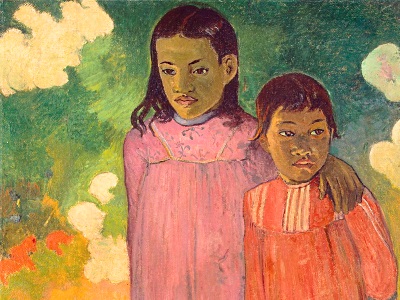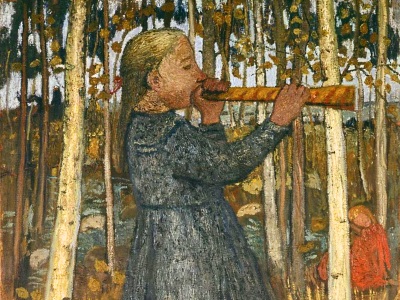When childlike hearts are moved, it is the Holy Spirit who moves them. The child’s life represents a new beginning in the light. To be a child means to make a new beginning.
Everything belongs to God; therefore everything belongs to the children. They are God’s children, truly children of God, the children of God’s Spirit, who creates all things.
We want to bring the little children very close to Jesus. In their nature lies just that which belongs to the kingdom of God.
Our work with children rests on the faith that the living Christ wishes to stir from within each person all that is good in the way of decisions and abilities. The less the powers of hatred hold sway over a person the more open that person's heart is to the Spirit of peace and unity. So we concern ourselves in a special way with children, because they are not yet bound to the powers of evil to such an extent as grown-ups; for good powers lie latent in the child, waiting to be awakened. All brothers and sisters are ready to help the children, but in particular those who share the life of the children inside and outside the school.
A Child is Trusting
Children trustingly accept everything we give them, not to take possession of it but to become absorbed in it. Children do not feel any barriers between themselves and the great world around them. In the very act of receiving, they give themselves. Small children do not separate themselves from what they experience. They sense what is given to them as part of the great world in which they become absorbed.
A Child Believes in Forgiveness
This is the childlike spirit: all children feel with perfect security that their father and mother will forgive them endlessly, no matter how many times they do something wrong. It would never occur to a child that the forgiving love of their father and mother might come to an end because they were naughty too many times.
A Child is Outspoken
Genuine children will tell us immediately what they feel. As long as we let them be children, they will say what they do not like. They will not keep something quiet to a person’s face and then talk about it behind that person's back. Cowardly deception is unchildlike. Real children are completely open; they are always ready to reveal whatever is in their hearts.
A Child is a Free Person
Children are free, truly free. All children are free! They must never become the property of father or mother, much less of anyone else. Any action that deprives children of their freedom is a despising and degrading of children.
God’s heart loves little children and his eye is upon them. He sees in them his own childlike Spirit. Therefore we must honor God in children; we must honor his messengers in them.
A Child Has an Innate Religious Feeling
In children we find a capacity for trust, justice, and self-forgetful enthusiasm that we ourselves have lost. This quality is what Jesus means when he says, “You must become like little children” (Matt. 18:3).
Children experience the mystery of what is sacred and divine, though of course in quite a different way from grown-ups. Children have no knowledge of religious dogma or of the established form of church services. But they experience the mystery of sacred things because they are free from thoughts about their little self – free from self-observation – free to take into their hearts the mystery of all life. They sense the light of God behind the stars that are kindled in the sky; in the wind they sense the soaring of angels. They sense the living creative Spirit when they see the flowers swaying in the breeze. They sense the beauty and strength of God’s Spirit in the splendors of nature. In the love of people for one another and in the love of their own child heart, they sense the mystery of God’s love, the source of life.
For real children, love is creative joy in whatever they love. In this love they abandon themselves to the things that bring them joy. That is why children can show a trust hardly ever found in us adults. The child is a trusting being, made for community.
A Child Has a Sense of Social Justice
All real children are social beings with an instinctive sense of justice, which urges them to help anyone who is worse off than they are. In a living organism, in a body united within itself, no cell lives for itself. Each one freely serves the others. So-called natural selfishness, even in children, is a disease or period of temptation and must be overcome. It contradicts the enthusiasm of children, which shows itself in their unselfish devotion to others and their natural feeling for justice.
Any educating must be guided by the basic qualities inherent in every child: faith and trust, wonder and reverence, and self-forgetful surrender. These qualities of the true child actually reveal to us what humanity’s true nature should be.
A Child is an Individual
We respect the personality and uniqueness of each child in the light of something deeper than the purely personal, for this leads through the development of the individual to community, which is beyond the personal. In this way, individual abilities become serviceable for the whole. The specific gifts of every single child should be recognized and helped to develop along the lines of the child's true vocation. In the deeper sense, this must and will lead to loving service of the community of humankind, to the uniting of all the special characteristics of each one. Our community education therefore means doing justice to all children in the unfolding of all the abilities given to each of them. Under no circumstances should we force on any of the children anything that is not given them at birth, that does not come from their own heart as their spiritual life awakens, that is not newly begotten and born in them through God. Guiding children toward a vocation has to be different for every single child; it will then be decisive for their whole life and will prepare them for their calling in practical service.
We cannot mold our children to conform to our own wishes. The only true service to our children is to help them become what they already are in God’s thoughts. Each child is a thought in the mind of God, and we should not try to mold a child according to our own ideas for that child's development. That would not be true service to the child. We will be able to do that service only if in each child we grasp the thought God has had for this very child from all eternity, and still has and will always hold to. This thought of God is the holy “Thou Shalt” for this child. God knows what this child is meant to be. This is the service of the church, of the parents, of all of us: to allow the child to become what this particular child is meant to be according to God’s original thought. And here again, we need the religious intuition that enables us to grasp this thought of God, as yet apparently hidden from us – to grasp it more and more clearly from day to day, from moment to moment, from year to year. Then the molding of the child is not something we undertake. Rather, our service consists precisely in helping with the molding God has in mind. That is the secret of service.
Adapted from Children’s Education in Community (Walden, NY: Plough, 2017). The text incorporates a number of excerpts from Eberhard Arnold's work over the years. These can be read in our digital archive: "Our Approach to Education" (1927); "The Fight for Childhood" (1928); The Children’s Community of the Alm Bruderhof and Its Education (April, 1934); meeting transcript, September 30, 1934; and meeting transcript, October 13, 1935.


